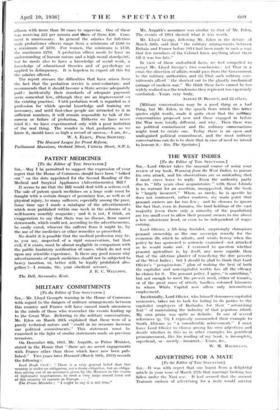, MILITARY COMMITMENT
[To the Editor of TIIE SPECTATOR.] Sm,—Mr. Lloyd George1/4 warning in the House of Commons with regard to the dangers of military arrangements between this country and France will have caused much uneasiness in the minds of those who remember the events leading up to the Great War. Referring to the military conversations, Mr. Eden on March 26th explained that these were of a purely technical nature and could in no measure increase our political commitments." This statement must be examined-in the light of similar statements made on previous occasions. • On December 6th, 1911, Mr. Asquith, as Prime Minister, stated in the House that " there are no secret engagements with France other than those which have now been • pub- lished." Two years later Hansard (March 10th, 1913) records the following :
Lord Hugh Cecil : "There is a very general belief that this country is under an obligation, not a treaty obligation, but an obliga- tion arising out of an assurance given by the Minister in the course of diplomatic negotiations. to send a very large armed force out of this country to operate in Europe. . ." The Prime -.Minister "I ought to say it is not true."
Mr.. Asquith's assurance was similar to that of Mr. Eden. The events of 1914 showed what it was worth.
Mr. Lloyd George, following Mr. Eden in the debate of March 26th, said that " the military arrangements between Britain and France before 1914 had been made in such a way that few members of the Cabinet knew anything about them till it was too lute."
In view of these undoubted facts, we feel compelled to accept Mr. Lloyd George's two conclusions : (a) That in a crisis the direction of affairs would pass front the Cover ttttt ent to the military authorities, and (b) That such military com- mitments afford " the shortest cut to the ghastly mechanical carnage of modern war." We think these facts cannot be too widely realised nor the tendencies they represent too vigorously eombatted.—Yours very truly, ALBERT D. BELDEN, and 22 others.
[Military conversations may be a good thing or a bad thing, but Mr. Eden, in the speech from which this letter quotes eight words, made it quite clear that the military conversations proposed now and those engaged in before the War were totally different, and why. Then there was no political conimitment and the military conversations might tend to create one. Today there is an open and undisguised political commitment, and the most military conversations can do is to show that in case of need we intend to honour it.—ED. The Spectator.]










































 Previous page
Previous page